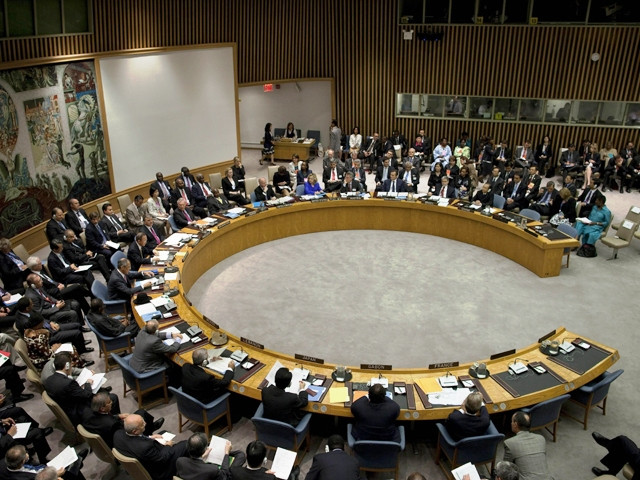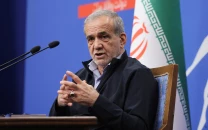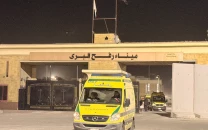UN SC approves misson to oversee destruction of Syria’s chemical weapons
The operation is scheduled to be completed by June 30, 2014

Security Council has endorsed the Ban Ki-Moon’s plan to deploy as many as 100 UN and OPCW experts to carry out the multi-phase operation to implement the council’s resolution on eliminating Syria’s chemical weapons. PHOTO: AFP/FILE
The Security Council endorsed UN Secretary General Ban Ki-Moon’s plan to deploy as many as 100 UN and Organisation for the Prohibition of Chemical Weapons (OPCW) experts to carry out a multi-phase operation to implement the council’s resolution on eliminating Syria’s chemical weapons. The operation is scheduled to be completed by June 30, 2014
The resolution was passed last month after Syria agreed to join the Chemical Weapons Convention following a chemical weapons attack in August that killed hundreds of people in a Damascus suburb. It is unclear who launched the August attack.
Over 100, 000 people have already been killed and over 6.5 million driven homeless in the ongoing conflict in Syria since March, 2011.
Moon, in his response to the council’s resolution via video message from the ASEAN conference, said he was very pleased that the council moved quickly on his recommendation. “This is a sign of the international community’s commitment to eliminate chemical weapons.”
“We have a very tight deadline, but the United Nations is committed to work closely with the OPCW to get the job done. And I am just as committed and determined to make progress in the political and humanitarian tracks for the sake of the Syrian people,” said the UN secretary general.
Under the plan, the Syrian regime will be responsible for the physical destruction of the chemical weapons facilities, stocks and associated materials as UN and OPCW are not mandated to conduct actual destruction activities, but they will oversee the process.
Syria, which agreed to the destruction of its chemical weapon stockpiles, put the condition that it will not bear the near $1 billion cost of destroying the weapons.
An advance team of experts and support staff from UN and OPCW have already started overseeing the destruction of chemical weapon production facilities in Syria.
Earlier, UN had reported a mortar was fired near the Damascus hotel where inspection team had based its operations initially.
The UN and the OPCW reported on Thursday that an advance team has made “good progress” since it began its operations earlier this month. The joint statement of the organisations stated that verification teams have inspected three sites in the first 10 days of operation on the ground and it plans to visit more sites.
A second team from OPCW and UN had arrived in Damascus on Thursday, bringing the total member of inspection team to 60.
According to the statement released by the organisations, currently OPCW is verifying the information provided by the Syrian government regarding its chemical weapons programme. It has also overseen the destruction by Syria of some of its munitions stockpile as well as some of its chemical weapons production equipment.
On Wednesday, the OPCW’s Director-General, Ahmet Üzümcü, said the first verification activities would be completed by the end of this month and production facilities would also be rendered unusable by that time as well.
Jans Laerke, the spokesperson for the Office for the Coordination of Humanitarian Affairs (OCHA), warned that soaring food prices, the unavailability of food for children, displacement and loss of income have made it difficult to provide Syrian children with adequate healthcare and nutrition.
The number of children admitted to hospitals with severe or acute malnutrition has reportedly increased in Aleppo, Dar’a Deir-ez-Zor, Hama, Homs and other areas, said Laerke.
He further added that as winter approaches, the humanitarian agencies in Syria are preparing to assist the displaced families living in damaged and collective shelters by insulating the shelters against the freezing temperatures during winter. They have also begun stocking items such as warm clothes, thermal blankets and hot water bottles.



















COMMENTS
Comments are moderated and generally will be posted if they are on-topic and not abusive.
For more information, please see our Comments FAQ